- Home
- J. T. Edson
Quiet Town
Quiet Town Read online
JT
EDSON
QUIET TOWN
LAWMAN
They didn’t have any law in Quiet Town—except that of the gun. Three good men had the badge of Sheriff and died wearing it.
The good citizens felt that their town needed a real law man, someone who would play the killers and hard cases at their own game. They knew of one man who could do the job. His name was Dusty Fog.
THE QUIET TOWN
A CORGI BOOK 552 07895 6
Originally published in Great Britain
by Brown Watson Ltd.
PRINTING HISTORY
Corgi edition published 1968
Corgi edition reprinted 1969
Corgi edition reprinted 1972
Corgi edition reprinted 1976
Copyright © 1962 by Brown Watson Ltd.
Copyright © 1968 by Transworld Publishers Ltd.
This book was first published under a
pseudonym of J. T. Edson, Chuck Nolan.
This low-priced Corgi Book has been completely reset in a type face designed for easy reading, and was printed from new plates. It contains the complete text of the original hard-cover edition.
Conditions of sale
1: This book is sold subject to the condition that it shall not, by way of trade or otherwise, be lent, re-sold, hired out or otherwise circulated without the publisher’s prior consent in any form of binding or cover other than that in which it is published and without a similar condition including this condition being imposed on the subsequent purchaser.
2: This book is sold subject to the Standard Conditions of Sale of Net Books and may not be re-sold in the U.K. below the net price fixed by the publishers for the book.
This book is set in 9pt Times Roman
Corgi Books are published by Transworld Publishers Ltd.,
Century house, 61—63 Uxbridge Road,
Ealing, London, W.5.
Made and printed in Great Britain by
Hunt Barnard Printing Ltd., Aylesbury, Bucks,
QUIET TOWN
CHAPTER ONE
Citizen’s Arrest
QUIET TOWN wasn’t. Fact being, since that day, eight months before, when gold was struck in the hills, the town had been far from quiet. The gold vein was still paying in the same quantities, even though there were gloomy predictions that it would not last. However, the rich vein still poured forth, and money still flowed into the capacious pockets of the business men of the town.
From a raw frontier hamlet of some twenty houses Quiet Town swelled into a square mile or more of saloons, dance-halls, gambling hells, brothels, stores and houses. It was built in a rough square, and based on a cross formed by Grant Street, flowing roughly East to West, and Lee Street running just as roughly North to South. At the flourishing crossroads stood the four largest and most imposing buildings of the town. These were Bearcat Annie’s Saloon, unusual in that it was operated by a woman, the Golden Gal Dancehall, Irish Pat’s Whisky Parlour and the Beaumain Theatre on whose rough boards had appeared some of the most famous and talented performers of the day.
Working away from these four examples of civic pride the rest of the town straggled off with typical Western disregard for planning and neat arrangement. The buildings were of different standards of splendour, depending on the financial status of the owners. Amongst the largest and most prosperous of all was Buzzard Grimwood’s Funeral Parlour. This was the only such business in the town and Grimwood lived in some style on the profits made by his hearses.
Not that Quiet Town had any need to be ashamed of any of her civic amenities. The jail and town marshal’s office was a large and imposing stonebuilt structure which the City Fathers fondly hoped would pay for itself in imposed fines. The bank was also built of stone and its vaults often held more wealth than most Eastern banks saw in a year. The rest of the buildings were mostly built of timber, the houses of the citizens neither so large or well made as the business section.
Day and night the town boomed wide open. The miners came pouring in from the diggings with their money hanging heavily in their pockets. They wanted to be relieved of the weight and the good citizens were only too eager to help with the removing. No honest women dare to be seen after dark on the streets. The crash of shots was no strange sound and men died violently to the tune of roaring guns. They were tough and hard men who ripped their living from the Montana hills. There was just as rough a crowd waiting to relieve the miners of their wealth, none hampered by scruples and few with self-restraint. The painted girls who could and did walk the streets after dark were obliged to carry one of Henry Derringer, or his many copiers’, little pistols on their person. All were willing to use it to defend, if not their honour, whatever else they held dear.
To add to this throng came Texas cowhands, bringing herds to sell to the meat-hungry miners, or visiting after trailing a herd to the Kansas railheads. They came to spend their pay and did not help to make Quiet Town any more civilized or sedate for every man of them walked armed and was willing to use his guns with little or no provocation.
It was one of these wild Sons of the saddle who gave Quiet Town its name. He came into town and in the course of two hours saw a fatal shooting, a knife fight, a brawl which wrecked a saloon and an explosion caused by a drunken miner gaily tossing a stick of dynamite into a vacant lot. The Texan studied all of this then went into Bearcat Annie’s place and announced:
“I’d tell a man this is one quiet town.”
The cowhand’s words were treated with the honour they deserved and the cowhand was feted until he left. The name came and stuck and instead of being called Gillem the metropolis became Quiet Town.
So Quiet Town was named and prospered, its sidewalks ringing to the thud of boots and the air shattered by shots. The hearses of Buzzard Grimwood were pulled by their teams of matched blacks to and from the various killings, the wheels helping to churn up and hide from sight the bloodstains on the streets.
A wise man that Grimwood. He had been one of the first citizens to arrive after the gold strike. Thinking over what he’d seen in other such towns he approached the City Fathers with a proposition. There was to be no cheap boothill in Quiet Town, every man who died here was to receive a proper burial. The City Fathers, full of civic pride, agreed. Grimwood knew many who died would be. broke so he pressed for, and was granted, payment by the town for any such as died. The City Fathers were proud of their liberal and progressive attitude until, too late, they discovered Grimwood was fast becoming the richest man in town. He was the only undertaker; two more started in opposition but fell by the wayside.
The law in Quiet Town was all but nonexistent. Three good men held the badge and died wearing it. Now a drunken, cowardly loafer disgraced the office of Marshal of Quiet Town. The City Fathers, aware of what was happening, fumed and tried to get Hickok, Dan Troop or Matt Dillon, but all three were fully engaged by the Kansas trailend towns and could not come. The leader of the City Fathers, old Matt Gillem wrote to a good friend in Texas but so far he had heard nothing from the friend.
The poker game in Irish Pat’s Whisky Parlour attracted little or no attention. For one thing it was early Monday morning, for another, in a place where thousands were won and lost, a game with a five dollar limit was nothing to bother about. The players were a varied group, a miner, two Texas cowhands and a professional gambler called Baker. Of the four only Baker was known around the town and even he was not well known. He was a newcomer, having recently arrived from one of the Kansas trailend towns, he and a hulking man called Bull Moose. They went around the small stake games. Baker playing and Moose watching. Neither were easy in their minds and watched any cowhand who came near with worried eyes. When new Texas men came into, town Baker and his friend would look them over from,
a distance before going near.
Behind the bar Irish Pat glanced at the game, then at his only other customers, members of the City Council. These sat at their usual table, working out how much damage had been done in the revels of the weekend. They were small, wizened and untidy looking Sam Gillem, the banker; Frank Barsen, who with Irish Pat represented the saloon keepers; Hans Soehnen and Angus McTavish who spoke for the mine owners and miners; Will Lealen, the gunsmith, and Bradgate from the hardware store who were the business men’s representatives. They were talking and Irish Pat left the bar untended to join them.
The poker players were not so absorbed in their game that they could not spare a glance at the batwing doors as they opened to admit two men. One was tall and would have caught the eye, the other smaller, insignificant looking. They were a pair of Texas cowhands and Baker looked them over with worried eyes.
The taller of the pair was Indian dark, his face almost babyishly innocent. His black Stetson hat, low of clown and widely brimmed, was pushed back and his hair was so black it shone almost blue. His red hazel eyes were not young, and they held something which made a man think twice before he dismissed that black-dressed boy. From hat to boots the young man wore all black; even his gunbelt was of black leather. Only the walnut grips of the old Dragoon gun holstered butt forward at his right and the ivory hilt of the bowie knife at his left were not black. There was something wild and Indian about this boy, something the two Texas men could read far better than any of the others.
The other man was smaller, not more than five foot six as opposed to the six foot of his friend. He was far from the eye catching kind. His Texas style black Stetson was also pushed back, his hair a dusty blond colour. His face was tanned, handsome. To a man who could read the signs it showed power, strength and intelligence. A tight-rolled, long blue bandana was knotted around his throat and the end hung almost to the waistband of his levis. His dark blue shirt was new looking, tucked into his levis. These were cowhand style, the legs hanging outside over his expensive and fancy stitched boots, the cuffs turned back. Around his waist was a hand-carved buscadero gunbelt, butt forward in the holsters, a matched brace of white-handled Colt 1860 Army revolvers.
For a moment they stood at the door, looking around, then moved forward. The black dressed boy walked with a catlike grace, giving the impression that he could cross dry sticks without making a sound. At the table they halted, looking at the players and the, smaller spoke:
“Room for players?”
Baker looked the two men over, licking his lips nervously. Before he could make any reply the miner grinned and waved to the empty chairs. “Sure, set and play on with us. Five dollar limit.”
The small man took a seat then glanced at his friend. “You playing, Lon?”
“Nope. My pappy allus allowed a man shouldn’t take likker, cards nor women on an empty stomach. I’ll just take me something from the free lunch there.”
While his friend walked towards the free lunch counter the small man looked over the other players in the game. The miner was big, and bearded, with the sleeves of his shirt rolled up from his brawny arms. One of the two cowhands was tall, his hat hung on the back of his chair. His hair was black, his face studious and pale, yet it was a tan resisting pallor. A gay coloured bandana was knotted at his throat and his shirt was open at the neck, the collar over the collar of his coat. The brown coat’s right side was stitched back to leave clear the ivory butt of the Army Colt at his side.
The other cowhand was a couple of inches smaller, wide shouldered and with rusty red hair. He wore Texas cowhand dress and holstered at his side was a Dance Bros. revolver. He handled his cards with a flourish and introduced the other players. “This here’s,” be indicated the other cowhand, “my pard, Doc Leroy. This’s Mike and this’s Baker. I’m Rusty Willis.”
“Howdy,” the small man said, taking a billfold from his shirt and extracting some money. “Call me Dusty.”
Rusty Willis and Doc Leroy exchanged glances. They knew cowhands and knew that despite his small size and insignificant appearance this young man was a top-hand of his and their trade. They knew something of a man called Dusty. So did the gambler. Baker looked to where his friend, Bull Moose, lounged against the bar and made a sign. The hulking man came forward, moving around the table to halt as if to stand and kibitz on the players. He stood just behind the small Texan called Dusty.
Rusty Willis dealt the cards, flipping them out fast across the table. The others looked at their hands. Baker held a stack of silver dollars in his right hand, stacking them up and down nervously. The others sat with their attention on their cards. Dusty looked up and remarked, “I learned this game from a kinsman of mine. A man called Lane Clements.”
Baker gave a muffled curse, the coins shooting from his hand to roll in front of Rusty Willis who brushed them aside. “I knows I’m going to take the hand, friend,” he said. “But let’s give you the pleasure of playing them first.”
But despite the cheerful words there was a subtle difference in the air of the game. The miner could feel it less than the two cowhands. Baker glanced at each of the three cowhands. There did not appear to be any connection between them, Doc Leroy and Rusty Willis had been in town since Friday and this other man was newly arrived. Baker was sure they were strangers, but he was wary now and, looming behind the small Texan, Bull Moose was scowling.
The hand finished with Rusty taking the pot and the cards passing to Baker. The man scowled as he riffled the cards leaving five hearts on the bottom of the deck. He held the cards out for the miner to cut and Mike did as he had been doing all the time, just tapped the deck without cutting. Then Baker took the cards in his left hand, three fingers gripping the long edge, the index finger curling around the short edge as if to hold the deck square.
Dusty was watching everything. He saw a glint in Doc Leroy’s eyes and spoke, his voice still that soft, even drawl yet somehow full of menace “Turn your cards, gambling man. If you’ve got five hearts—!”
Baker flung back his chair, hand going under his coat to the butt of his singleshot Deringer. At the same moment Bull Moose dropped his shoulder and tried to knock the Texan from his feet as he rose. Only Dusty did not rise. It was as if he knew what was going to happen for instead of coming to his feet as had the others he fell sideways from his chair. Baker saw the move but was too late to correct his aim. The Deringer roared out, throwing its deadly load full into Bull Moose’s body. Dusty landed, his left hand holding a Colt even before he hit the floor. His right hand fanned the hammer fast, three shots came in a single roll of sound. The table top erupted in splinters and Baker rocked backwards, going down as dead as a man could be when bit under the chin with three .44 bullets which came out through the top of his head.
Dusty came to his feet, his gun smoking in his hand. He twisted to look at the members of the town council who were all on their feet at the table. Then he stepped forward to kick the Deringer away from Baker’s hand. He bent and looked at the man, then straightened again and went to look at Bull Moose who was on his back and gasping his last.
Doc Leroy stepped forward and turned Baker’s cards over, five hearts were exposed to view. “You got real quick eyes friend, and quicker hands. I saw him use the grip and fetch them from the bottom. Was all set to call him myself.”
“Man’d say you knew how be aimed to make his play,” Rusty went on.
“That was how they downed my cousin, Lane Clements down to Newton. Dan Troop told me about it.”
Rusty Willis and Doc Leroy showed no surprise at the statement. They knew the deep loyalty to the clan all southern men felt. Naturally this young man called Dusty would seek out and have a reckoning with any man who killed his kinsman like that. What surprised them was that Dan Troop would give any information about a killing to some chance passing stranger. It told them even more about that soft talking, insignificant man.
“Say one thing, the big hombre had sand to burn,” Rusty remarked, looking dow
n at Bull Moose. “Standing right behind you while his pard shot.”
“There’s not too much risk. A Deringer won’t throw a ball clear through a man,” Dusty answered. “He was—.”
The, saloon door was thrown open and the men crowded in. All but one of them were town dressed, fresh faced dudes with the stamp of new arrivals in the West. The other man was a bleary eyed, dirty and untidy looking individual in rumpled clothes and with the badge of town marshal tarnished upon his shirt. In his right hand he held a rusted Beals Navy revolver which he pointed halfheartedly at the group who stood by the table.
“Who done it?” he asked while his escort hefted the shotguns they held.
“I did,” the small Texan replied.
Looking at the Marshal, guns in leather, the small waited. “You’re under arrest, then.”
“What charge?”
The marshal licked his lips and did not speak. A fair haired, handsome young man standing just behind the Marshal answered, “For murder.”
“That’s a hard word, friend,” Lon said, moving from the bar to flank his friend. “Let’s go find—.”
The marshal studied the tall, Indian dark boy as he stood alongside his friend. There was something latently dangerous about him. The lawman thrust his Beals forward in what he hoped was a threatening manner but which more resembled a schoolboy holding out his hand for the teacher to cane. His voice was cracked as he said, “I got a gun in my hand.”
“Drop it!”
The voice came from behind the men, at the door they had just entered. It was a deep, southern drawl, a voice with authority. The voice of a man who stood behind a cocked and lined gun.

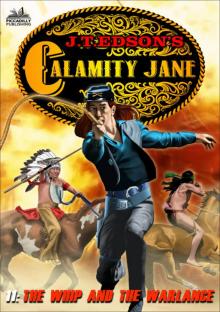 Calamity Jane 11
Calamity Jane 11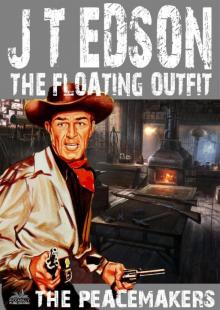 The Floating Outift 33
The Floating Outift 33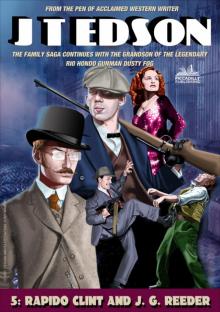 Cap Fog 5
Cap Fog 5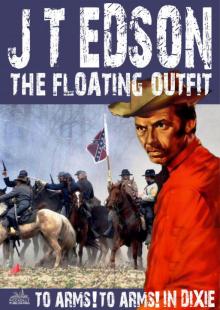 The Floating Outfit 34
The Floating Outfit 34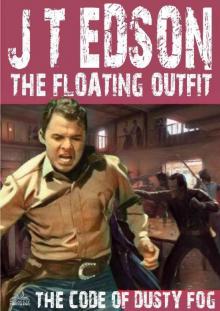 The Code of Dusty Fog
The Code of Dusty Fog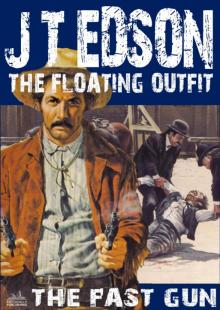 The Floating Outfit 21
The Floating Outfit 21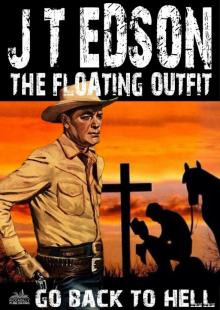 The Floating Outift 36
The Floating Outift 36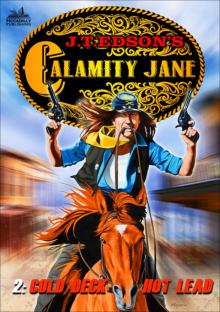 Calamity Jane 2
Calamity Jane 2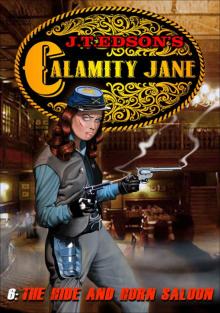 Calamity Jane 6: The Hide and Horn Saloon (A Calamity Jane Western)
Calamity Jane 6: The Hide and Horn Saloon (A Calamity Jane Western)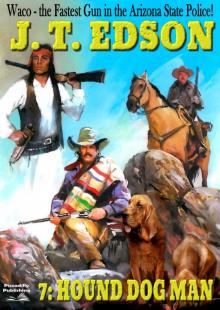 Waco 7
Waco 7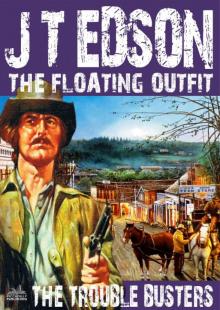 The Floating Outfit 25
The Floating Outfit 25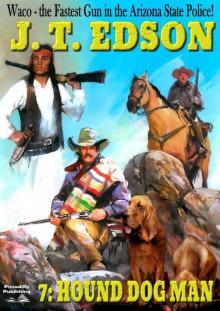 Waco 7: Hound Dog Man (A Waco Western)
Waco 7: Hound Dog Man (A Waco Western)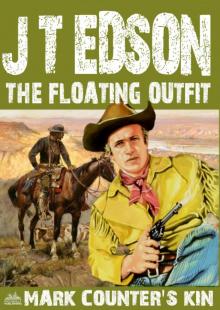 The Floating Outfit 47
The Floating Outfit 47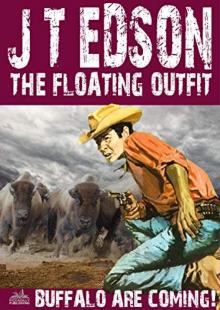 The Floating Outfit 42: Buffalo Are Coming!
The Floating Outfit 42: Buffalo Are Coming!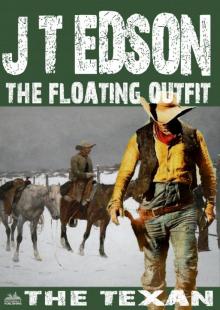 The Floating Outfit 46
The Floating Outfit 46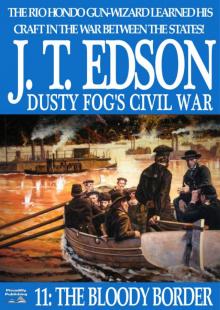 Dusty Fog's Civil War 11
Dusty Fog's Civil War 11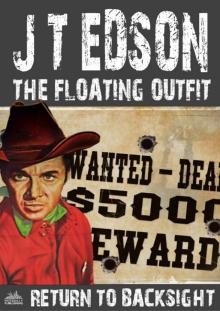 The Floating Outfit 61
The Floating Outfit 61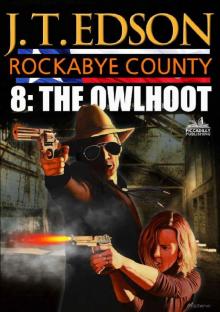 The Owlhoot
The Owlhoot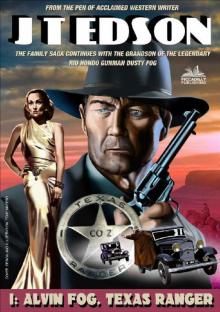 Alvin Fog, Texas Ranger
Alvin Fog, Texas Ranger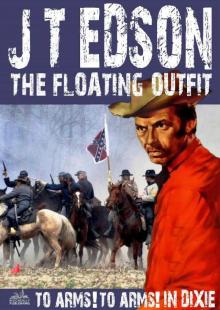 The Floating Outfit 34: To Arms! To Arms! In Dixie! (A Floating Outfit Western)
The Floating Outfit 34: To Arms! To Arms! In Dixie! (A Floating Outfit Western)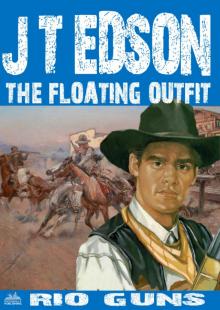 The Floating Outfit 44
The Floating Outfit 44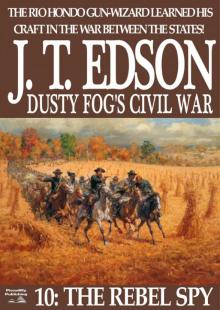 Dusty Fog's Civil War 10
Dusty Fog's Civil War 10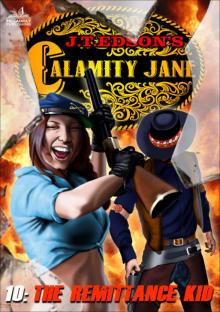 Calamity Jane 10
Calamity Jane 10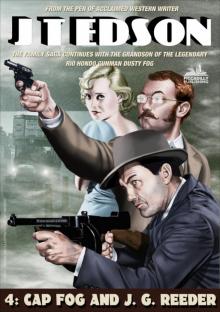 Cap Fog 4
Cap Fog 4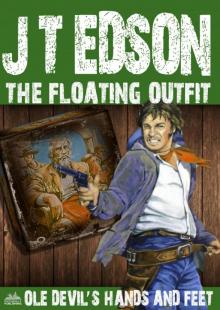 The Floating Outfit 51
The Floating Outfit 51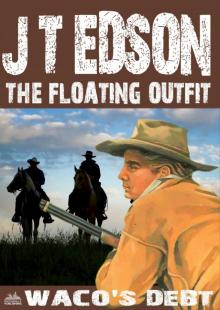 The Floating Outfit 50
The Floating Outfit 50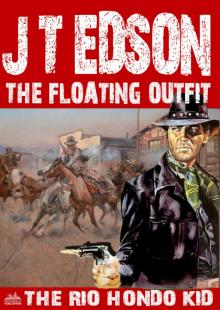 The Floating Outfit 49
The Floating Outfit 49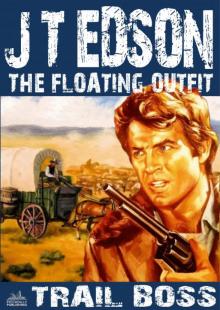 The Floating Outfit 10
The Floating Outfit 10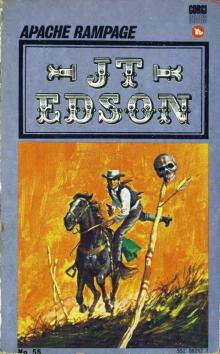 Apache Rampage
Apache Rampage The Floating Outfit 15
The Floating Outfit 15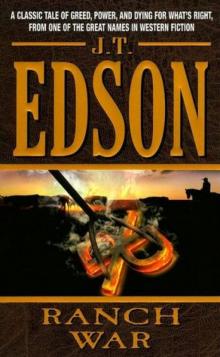 Ranch War
Ranch War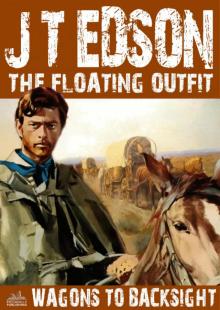 The Floating Outfit 11
The Floating Outfit 11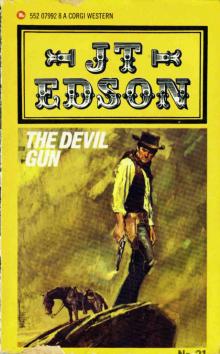 The Devil Gun
The Devil Gun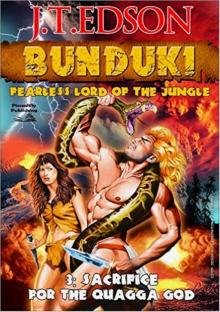 Sacrifice for the Quagga God (A Bunduki Jungle Adventure Book 3)
Sacrifice for the Quagga God (A Bunduki Jungle Adventure Book 3)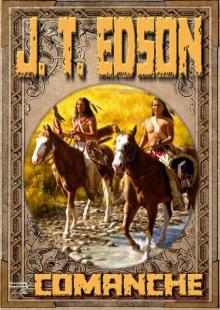 Comanche (A J.T. Edson Western Book 1)
Comanche (A J.T. Edson Western Book 1)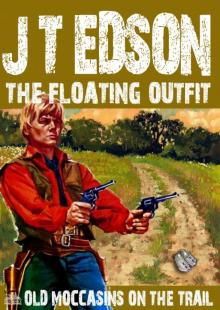 The Floating Outfit 48
The Floating Outfit 48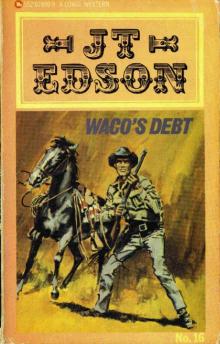 Wacos Debt
Wacos Debt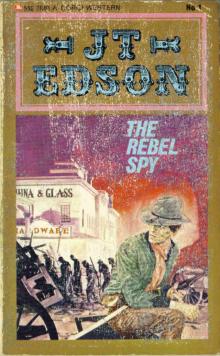 The Rebel Spy
The Rebel Spy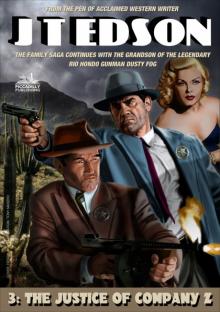 Cap Fog 3
Cap Fog 3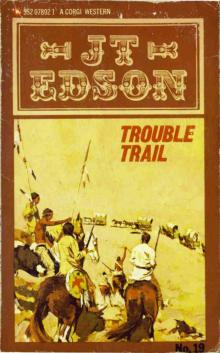 Trouble Trail
Trouble Trail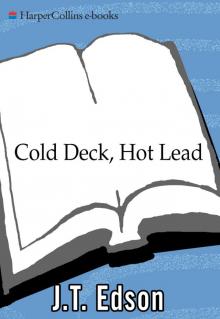 Cold Deck, Hot Lead
Cold Deck, Hot Lead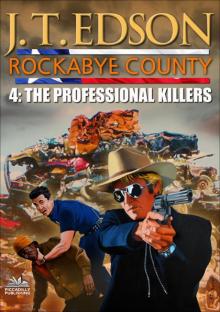 Rockabye County 4
Rockabye County 4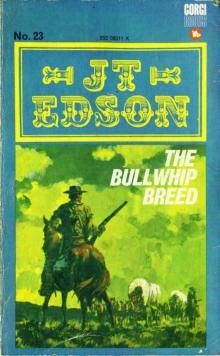 The Bullwhip Breed
The Bullwhip Breed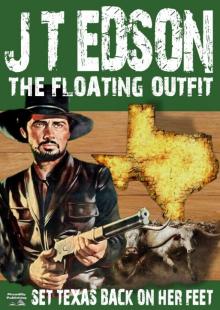 Set Texas Back On Her Feet (A Floating Outfit Western Book 6)
Set Texas Back On Her Feet (A Floating Outfit Western Book 6)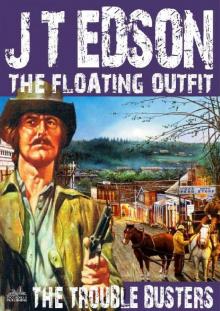 The Floating Outfit 25: The Trouble Busters (A Floating Outfit Western)
The Floating Outfit 25: The Trouble Busters (A Floating Outfit Western)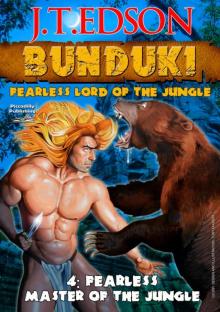 Fearless Master of the Jungle (A Bunduki Jungle Adventure
Fearless Master of the Jungle (A Bunduki Jungle Adventure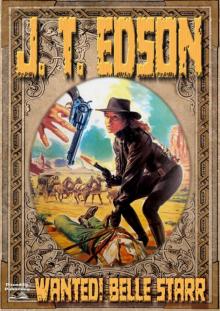 Wanted! Belle Starr!
Wanted! Belle Starr!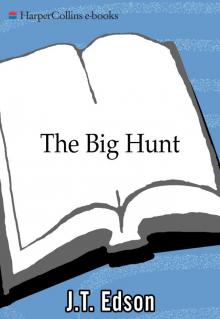 The Big Hunt
The Big Hunt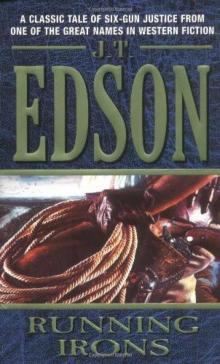 Running Irons
Running Irons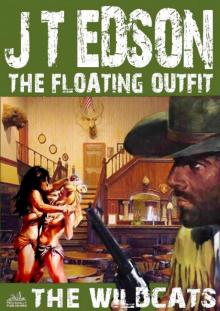 The Floating Outfit 19
The Floating Outfit 19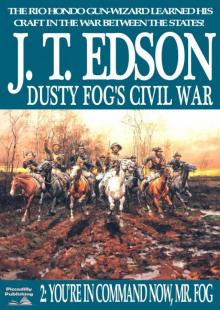 You're in Command Now, Mr Fog
You're in Command Now, Mr Fog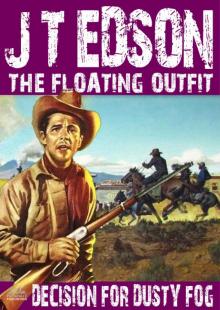 The Floating Outfit 27
The Floating Outfit 27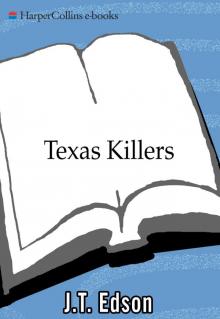 Texas Killers
Texas Killers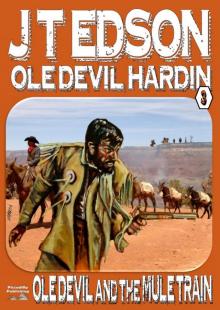 Ole Devil and the Mule Train (An Ole Devil Western Book 3)
Ole Devil and the Mule Train (An Ole Devil Western Book 3)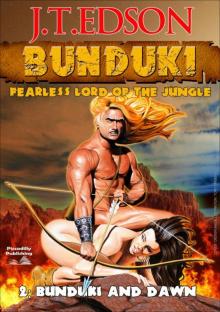 Bunduki and Dawn (A Bunduki Jungle Adventure Book 2)
Bunduki and Dawn (A Bunduki Jungle Adventure Book 2)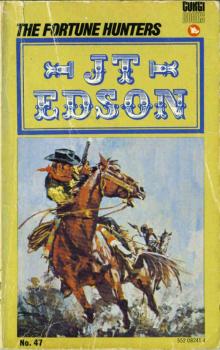 The Fortune Hunters
The Fortune Hunters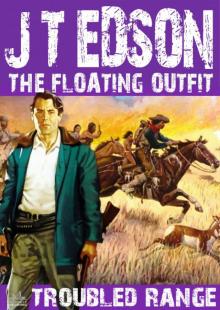 The Floating Outfit 12
The Floating Outfit 12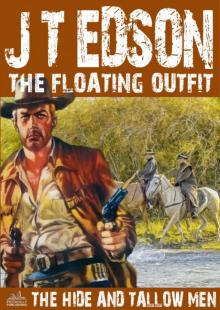 The Hide and Tallow Men (A Floating Outfit Western. Book 7)
The Hide and Tallow Men (A Floating Outfit Western. Book 7)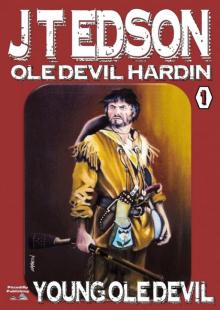 Young Ole Devil
Young Ole Devil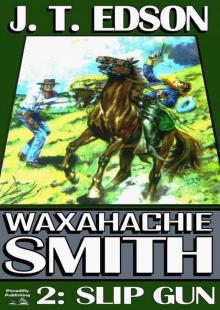 Slip Gun
Slip Gun The Drifter
The Drifter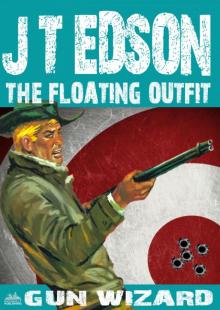 The Floating Outfit 45
The Floating Outfit 45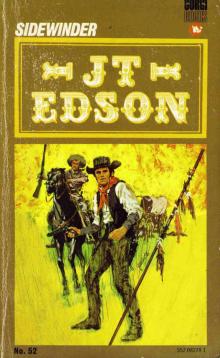 Sidewinder
Sidewinder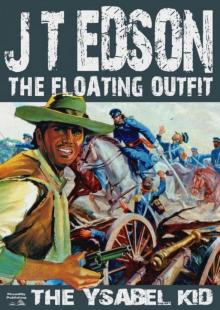 The Ysabel Kid
The Ysabel Kid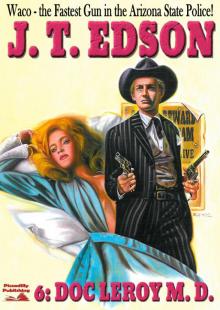 Waco 6
Waco 6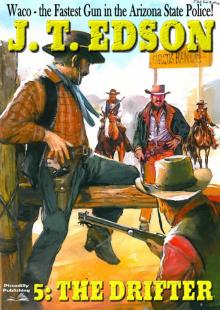 Waco 5
Waco 5 Point of Contact
Point of Contact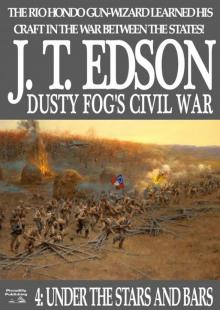 Under the Stars and Bars (A Dusty Fog Civil War Western Book 4)
Under the Stars and Bars (A Dusty Fog Civil War Western Book 4)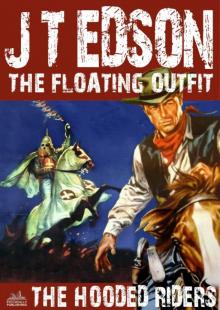 The Floating Outfit 9
The Floating Outfit 9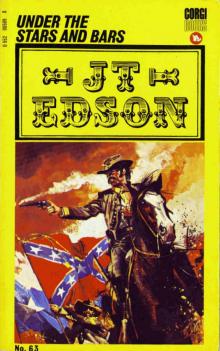 Under the Stars and Bars
Under the Stars and Bars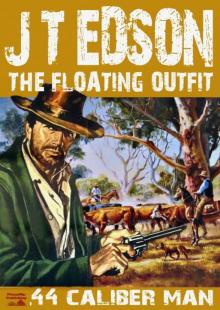 .44 Caliber Man
.44 Caliber Man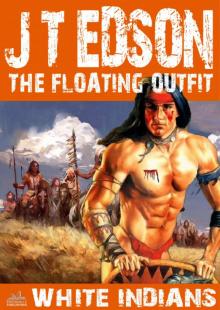 The Floating Outfit 17
The Floating Outfit 17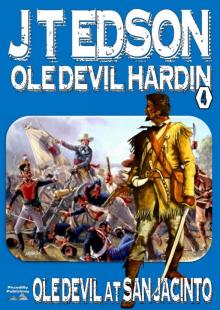 Ole Devil at San Jacinto (Old Devil Hardin Western Book 4)
Ole Devil at San Jacinto (Old Devil Hardin Western Book 4)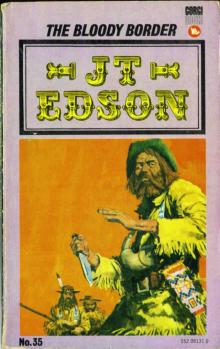 The Bloody Border
The Bloody Border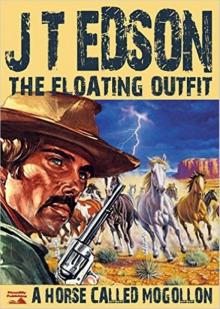 A Horse Called Mogollon (Floating Outfit Book 3)
A Horse Called Mogollon (Floating Outfit Book 3)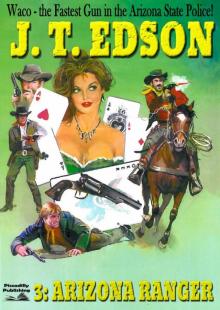 Waco 3
Waco 3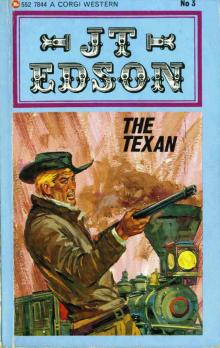 The Texan
The Texan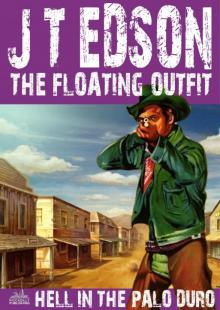 The Floating Outfit 35
The Floating Outfit 35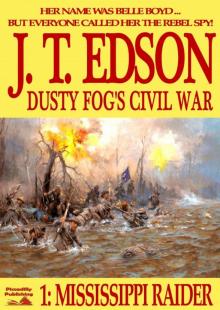 Mississippi Raider
Mississippi Raider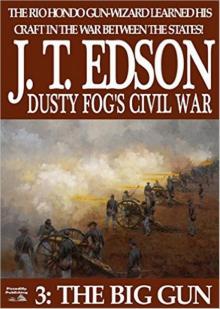 The Big Gun (Dusty Fog's Civil War Book 3)
The Big Gun (Dusty Fog's Civil War Book 3)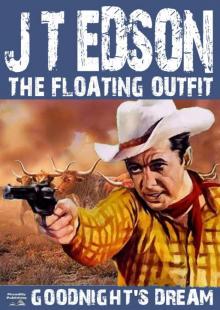 Goodnight's Dream (A Floating Outfit Western Book 4)
Goodnight's Dream (A Floating Outfit Western Book 4) Waco 4
Waco 4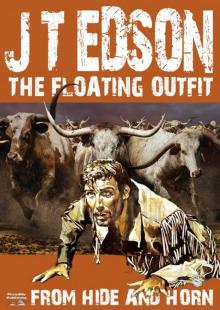 From Hide and Horn (A Floating Outfit Book Number 5)
From Hide and Horn (A Floating Outfit Book Number 5)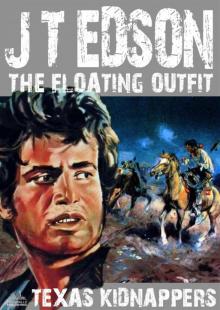 The Floating Outfit 18
The Floating Outfit 18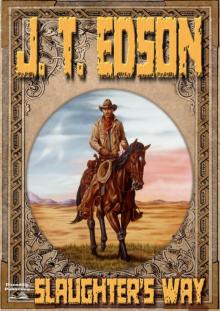 Slaughter's Way (A J.T. Edson Western)
Slaughter's Way (A J.T. Edson Western)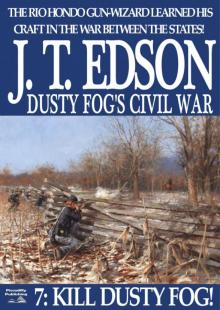 Dusty Fog's Civil War 7
Dusty Fog's Civil War 7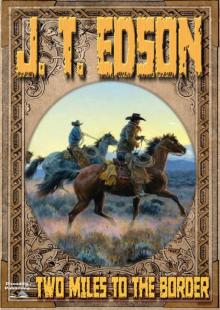 Two Miles to the Border (A J.T. Edson Western)
Two Miles to the Border (A J.T. Edson Western)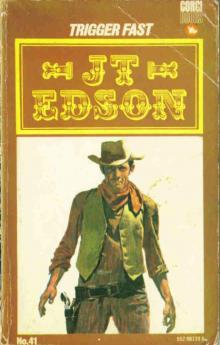 Trigger Fast
Trigger Fast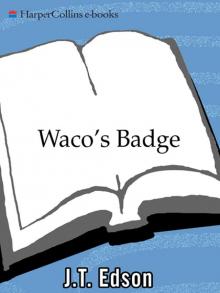 Waco's Badge
Waco's Badge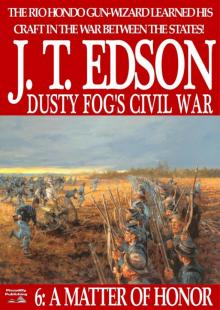 A Matter of Honor (Dusty Fog Civil War Book 6)
A Matter of Honor (Dusty Fog Civil War Book 6)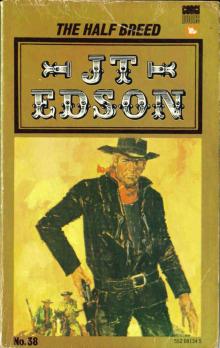 The Half Breed
The Half Breed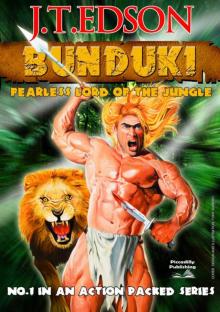 Bunduki (Bunduki Series Book One)
Bunduki (Bunduki Series Book One)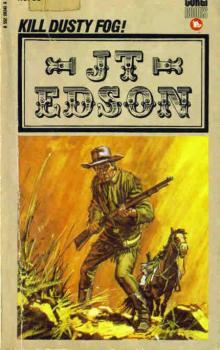 Kill Dusty Fog
Kill Dusty Fog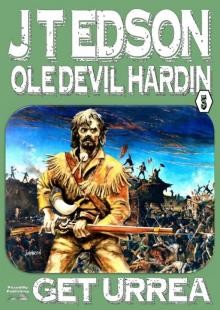 Get Urrea! (An Ole Devil Hardin Western Book 5)
Get Urrea! (An Ole Devil Hardin Western Book 5)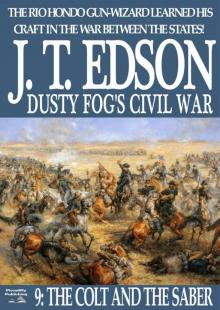 Dusty Fog's Civil War 9
Dusty Fog's Civil War 9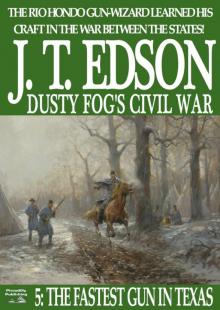 The Fastest Gun in Texas (A Dusty Fog Civil War Book 5)
The Fastest Gun in Texas (A Dusty Fog Civil War Book 5)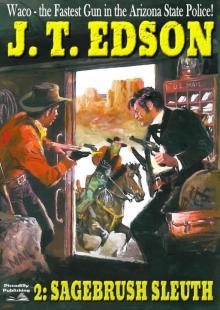 Sagebrush Sleuth (A Waco Western #2)
Sagebrush Sleuth (A Waco Western #2)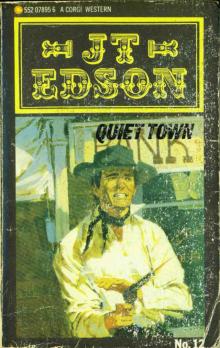 Quiet Town
Quiet Town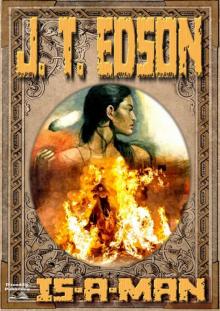 Is-A-Man (A J.T. Edson Standalone Western)
Is-A-Man (A J.T. Edson Standalone Western)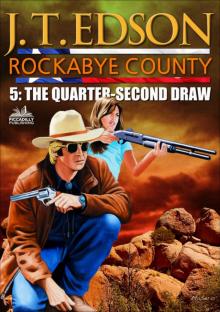 Rockabye County 5
Rockabye County 5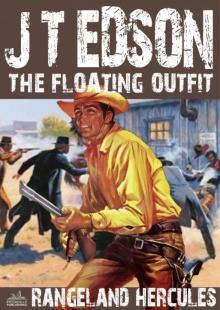 The Floating Outfit 14
The Floating Outfit 14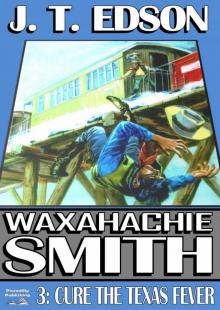 Cure the Texas Fever (A Waxahachie Smith Western--Book 3)
Cure the Texas Fever (A Waxahachie Smith Western--Book 3)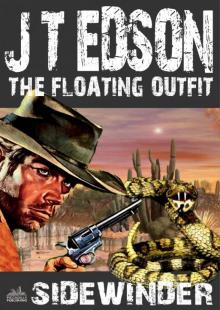 The Floating Outfit 13
The Floating Outfit 13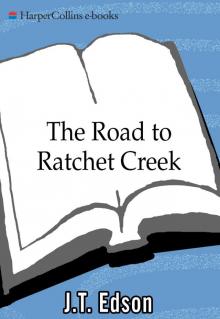 The Road to Ratchet Creek
The Road to Ratchet Creek